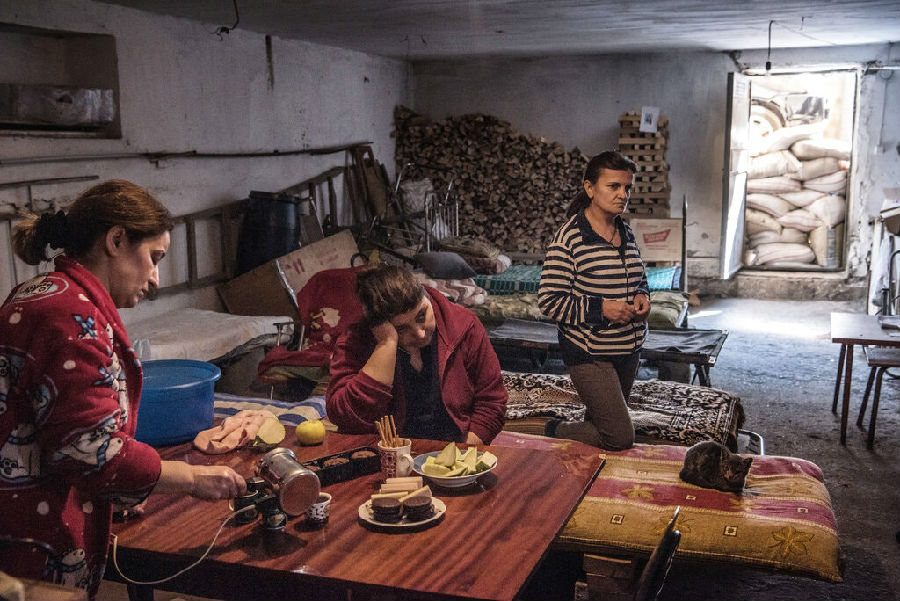Resignation and Despair Stoke Armenian Conflict.
順從和絕望引發(fā)亞美尼亞沖突
By Anton Troianovski
文/安東·特羅亞諾夫斯基。
On the front line, the stench is overwhelming.
前線散發(fā)著令人難以忍受的惡臭。
The remains of fighters have been lying there for weeks.
將士們的遺骸已經(jīng)在那里躺了幾個星期了。
In the trenches, there is fear.
恐懼在戰(zhàn)壕里彌漫。
The Armenians are defenseless against the Azerbaijani drones that hover overhead and kill at will.
阿塞拜疆無人機在頭頂盤旋,大開殺戒,亞美尼亞人顯得沒有絲毫還手之力。
At the military graveyard, bulldozers have scraped away a hillside.
烈士陵園里的推土機已經(jīng)鏟平了一個山坡。
It is already lined with two rows of new graves, along with soon-to-be-filled, freshly dug, rectangular holes.
陵園里又多了兩排新的墳?zāi)梗€有一些新挖好的方形墓坑不久之后也將被填滿。
The three-week-old conflict between Azerbaijan and Armenia over a disputed territory in the Caucasus Mountains,
這場已經(jīng)持續(xù)了三周的沖突爆發(fā)于阿塞拜疆和亞美尼亞之間,沖突的導(dǎo)火索是高加索山脈地區(qū)一片仍舊處于爭議之中的領(lǐng)土,
where Europe meets Asia, has settled into a brutal war of attrition,
此地也是歐洲與亞洲的交界地,沖突已經(jīng)升級為一場殘酷的消耗戰(zhàn),
soldiers and civilians said in interviews here on the ground in recent days.
據(jù)當(dāng)?shù)氐膶⑹亢推矫窠战邮軐嵉夭稍L時透露。
Azerbaijan is sacrificing columns of fighters, Armenians say, to eke out small territorial gains in the treacherous terrain of Nagorno-Karabakh,
據(jù)亞美尼亞方面透露,阿塞拜疆派出了多個縱隊,拼死維持他們在危險的納戈爾諾-卡拉巴赫地區(qū)勉強獲得的小片領(lǐng)地,
an ethnic Armenian enclave that is part of Azerbaijan under international law.
根據(jù)國際法,這是被亞美尼亞人占領(lǐng)的一塊阿塞拜疆飛地。

Civilians who have stayed behind live in their damp and unheated basements,
留下來的平民住進(jìn)了潮濕、沒有暖氣的地下室,
converted in recent weeks with makeshift kitchens,
最近幾周才臨時改造成了帶簡易廚房的住所,
and where some sleep on flattened cardboard boxes.
一些人則直接睡在壓平的紙箱上。
The shelling and missile barrages into the towns in Nagorno-Karabakh and Azerbaijan
對納戈爾諾-卡拉巴赫和阿塞拜疆城鎮(zhèn)的炮擊和導(dǎo)彈襲擊
have killed dozens of civilians and hundreds of soldiers and have filled the nights with terrifying flashes and booms.
已經(jīng)造成數(shù)十名平民和數(shù)百名將士死亡,還使當(dāng)?shù)氐囊雇沓錆M了可怕的閃光和轟鳴。
In the city of Stepanakert in Nagorno-Karabakh,
在納戈爾諾-卡拉巴赫的斯捷潘納克特市,
which I visited over four days last week with the photographer Sergey Ponomarev,
上周我和攝影師謝爾蓋·波諾馬廖夫在那里停留了四天,
artillery fire could often be heard in the distance.
經(jīng)常老遠(yuǎn)就能聽到炮火的聲音。
Late Friday the city itself came under attack.
周五晚些時候,這座城市自身也受到了襲擊。
Air raid sirens and bangs and thuds sounded throughout the night, as hotel guests rushed repeatedly for the basement.
空襲警報、炮彈的巨響和重?fù)袈晱匾共唤^,導(dǎo)致一波又一波的酒店顧客沖往地下室避險。
At least one of the shells landed by the city center, illuminating my hotel window with a bolt of yellow light.
至少有一枚炮彈落到了市中心,一道黃光隨即照亮了我入住的酒店的窗戶。
Manushak Titanyan, an architect in Nagorno-Karabakh, has already lost one of her buildings to the violence:
馬努沙克·泰坦揚是納戈爾諾-卡拉巴赫的一名建筑師,她設(shè)計的建筑已有一棟被這場暴力摧毀:
the House of Culture in the hilltop town of Shusha, its roof gone, a piece of it stuck in a tree across the street,
山頂小鎮(zhèn)舒沙的文化館,大樓的屋頂消失了,只有一小塊卡在街對面的一棵樹上,
the plush red seats coated in dust, the stage curtain tangled amid the rubble.
長毛絨的紅色座椅上落滿了灰塵,舞臺幕布在廢墟中糾纏在了一起。
Now she fears for her three sons, the youngest 18, who are at the front lines.
此時,她最擔(dān)心的還是她的三個兒子,最小的才18歲,他們都已經(jīng)上了前線。
譯文由可可原創(chuàng),僅供學(xué)習(xí)交流使用,未經(jīng)許可請勿轉(zhuǎn)載。











